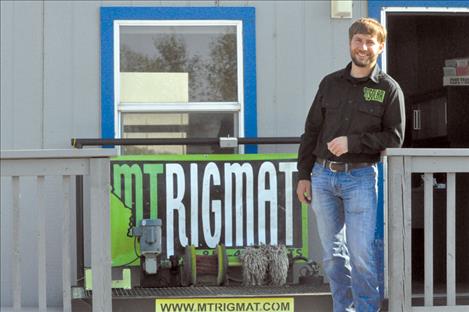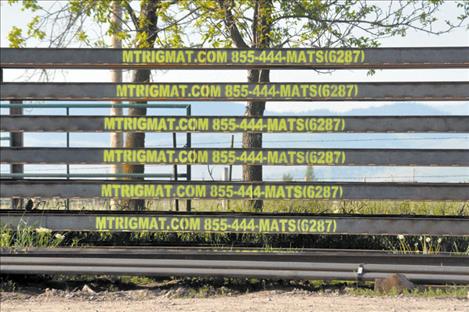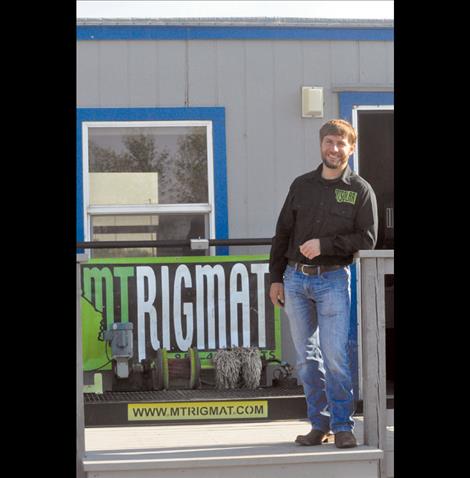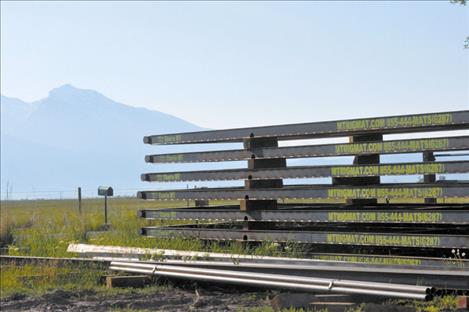Charlo company becomes leader in state energy sector
Hey savvy news reader! Thanks for choosing local.
You are now reading
1 of 3 free articles.
Persistence and innovation have caused a Charlo company to go from fledgling startup to one of the state’s energy sector leaders in four short years.
Travis Jordan, CEO of MT Rigmats and other offshoot subsidiary companies, says the success hasn’t come without a lot of work and struggle.
Jordan was an electrician in Ronan who didn’t have a lot of work despite an ebbing recession.
“I started casting around and the oil industry was running hot,” Jordan said. “I was looking at all of my friends and colleagues who were going to North Dakota for work and thought ‘There has got to be something we can build in Mission Valley and ship to North Dakota.’ This business of shipping all of our people over there is not ideal.”
Jordan made contact with people in Alberta who made rigmats, which provide support and mobility for oil rigs to remain stable and not collapse when remaining stationary or moving.
“It’s a platform that gets laid on the dirt to create a deck to mount the structure off of,” Jordan said. “It’s like a snowshoe. We need a form of snowshoe because when you are talking about a 3 million pound rig, (the soil) is as soft as deep snow is to humans.”
Albertans didn’t bite when Jordan proposed that they build a facility in Mission Valley for him to manage.
“I realized we were going to have to jump in with both feet,” he said.
He approached Lake County Community Development Corporation in Ronan for a startup loan, and got a bit of funding.
“I basically hocked my house, my truck, everything I had,” Jordan said. “We managed to put up some capital and secured some financing … We started cranking out product.”
Friends quit their full-time jobs to come and work for Jordan, who had bought some lumber, steel, welding supplies and a forklift so old it was nicknamed “the dinosaur.” The team built six rigmats from steel and wood, loaded them on a trailer and sent it to North Dakota.
“But we still didn’t have any customers,” Jordan said. “About that time stress was ramped up to a new level. I jumped in my truck and began driving to North Dakota for a few weeks … I was sleeping in my truck in the Walmart parking lot, because there were no motels in North Dakota in those days. Even if you could have found one we couldn’t afford one. These execs were flying in on private leer jets and paying $600 a night. This farm boy couldn’t handle that one. It’s sleep in your truck and spit bath the next morning and walk into the lobby with suits and ties when you are in cowboy boots and blue jeans.”
Jordan said he did a lot of praying and a phone call eventually came on a Thursday. The customer wanted eight rigmats by Saturday morning. The mats all had to be delivered at once or there wouldn’t be a deal. Jordan’s initial run of six rigmats wasn’t going to be enough.
Jordan’s work crew — plus four or five friends — got together with chainsaws and worked until after midnight on Friday night to get another two mats built to make the deadline.
“It just kind of grew from there,” Jordan said.
In three years time the business has gone on to sell 400 to 600 rigmats per year to oil companies all over the planet. The hard work appeared to have paid off.
“Mr. Jordan and his team were quick to capitalize on a growing industry, utilized local and regional partners where possible to keep the money in our community, managed expenses and have been proactive in managing risk,” Lake County Community Development Corporation Executive Director Gypsy Ray said.
Risk entered the equation when the bottom dropped out of the oil industry late last year. Production slowed. Business for rigmats dried up.
“I think we’ve only sold three truckloads of mats in three months,” Jordan said.
But Jordan had a back up plan.
In the midst of building the rigmat business, his team was also looking to expand in the solar industry. His team patented a system that can cut out much of the labor costs of building solar arrays by using poles that hoist the panels without scaffolding.
“It saves about 50 percent of the labor,” Jordan said. “It’s insane.”
In the past year, the sales of the system have boomed with shipments going all over the United States.
“The solar industry is seeing the same kind of growth boom that we saw in the oil industry in 2010-2014,” Jordan said.
MT Solar, the offshoot subsidiary of MT Rigmats, and Jordan Solar, Jordan’s solar installation company, recently landed a 100 kilowatt installation contract in Kalispell that will be the state’s largest solar array.
In the past month, Jordan said several electrical service providers have said that they plan to install solar arrays, where customers can buy a share of a solar project instead of having to hook up to their own system.
Jordan said business has doubled in the Montana solar market every year in the past four years, with almost no state incentives.
As solar grows, Jordan’s team has grown to 8-10 employees that are independent of the oil business. If the oil business bounces back to previous levels, he could need another 10-14 people to help keep up with demand.
And while he doesn’t have any new projects to announce, Jordan’s team just bought a metal plasma cutting system that is ripe for work.
“We plan to offer a full service machine shop,” Jordan said.
He said he hopes the community can have more manufacturing jobs besides his own.
“I feel strongly that manufacturing is important to our local community,” Jordan said. “And we need to work together as a community to find ways to incentivize export out of our area. We love the fact that our population is low and our population density is low. To support that and keep our standard of living that we would like to have, we need to look to exports. That’s what I am committed to around here.”



















